Hotspot policing: 'There's car thefts, breaks-ins, everything'
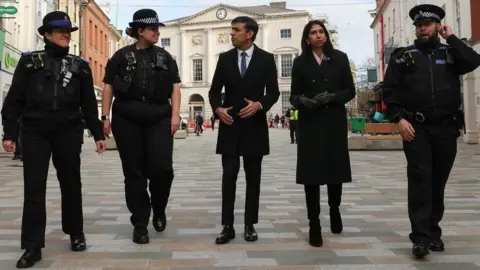 Reuters
ReutersThe government has announced a new crackdown on anti-social behaviour and claims perpetrators "will face swift and visible justice, increased fines and enhanced drug testing". What will it mean for those living in areas chosen to pilot the new measures?
Extra funding will be given to 16 areas across the country to support either "hotspot" policing or trial what the government calls "immediate justice".
The government said the schemes will be rolled out nationwide in 2024.
- "Hotspot" policing will see "extra enforcement patrols" in areas with the highest rates of anti-social behaviour
- "Immediate Justice" is a scheme meant to deliver swift and visible punishments. The government said it aimed to ensure those found committing anti-social behaviour would be made to repair the damage caused within 48 hours of the offence
Prime Minister Rishi Sunak announced the government's Anti-Social Behaviour Action Plan on Monday at Chelmsford Boxing Club in Essex. What do people living in the city make of the proposals, which for Essex will will mean an extra £1.2m for "hotspot" policing?

'There's car thefts, breaks-ins, everything'
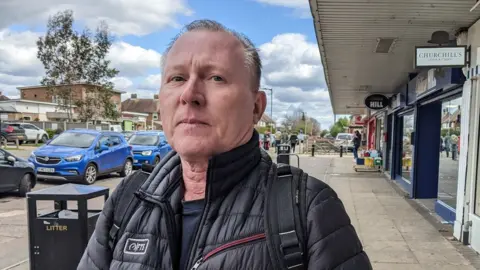
Jerry Morgan, 58, works in construction. He welcomes the extra funding for "hotspot policing".
He said there were numerous issues in the Melbourne Park area including vandalism.
In the past year, 1,000 incidents of anti-social behaviour have been reported in the Chelmsford Town policing area, which includes Melbourne Park.
Mr Morgan told how recently arsonists tried setting fire to his block of flats.
"There's vandalism - they like kicking in fence panels for some reason. There's car thefts, breaks-ins, everything.
"The main issue is drugs," he said. "They are so blatant, they don't even try to cover it up.
"They use the scooters and the back alleys, car parks - there are loads of meeting places. You can spot them a mile off, they don't try and hide it."
Asked what he thought the solution was, Mr Morgan said: "More coppers. We used to have quite a few PCSOs walking around but we haven't seen them for about three years, nothing.
"If you call the police, you're lucky if they turn up. They turn up when it is all over.
"When I moved here 17 years ago it was nowhere near as bad. I hope to move soon."

'I don't go out much'
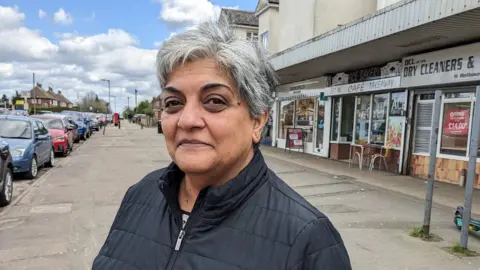
Salma Noormohamed said anti-social behaviour was an issue in the town centre.
She said people "hanging around and being rowdy, loud and drinking" risked making others "feel scared or nervous".
"Kids in the past have asked me to go in [to shops] and get alcohol for them," she said. "I don't go out much in the evening or even during the daytime.
"I think discipline at home and in schools is important," she said. "When I was growing up if I misbehaved I got a clip around the ear."

The pilot areas announced are:
- Northumbria (Immediate Justice and Hotspot policing)
- Cleveland (Immediate Justice and Hotspot policing)
- Derbyshire (Immediate Justice and Hotspot policing)
- Durham (Immediate Justice and Hotspot policing)
- Nottinghamshire (Immediate Justice)
- Merseyside (Immediate Justice)
- Sussex (Immediate Justice)
- Dorset (Immediate Justice)
- Northamptonshire (Immediate Justice)
- West Yorkshire (Immediate Justice)
- West Midlands (Hotspot policing)
- South Yorkshire (Hotspot policing)
- Essex (Hotspot policing)
- Lancashire (Hotspot policing)
- South Wales (Hotspot policing)
- Staffordshire (Hotspot policing)

'Utter waste of time'
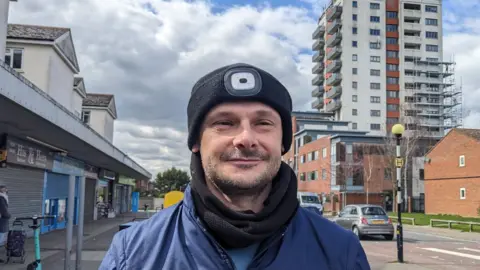
Engineer Iain Warner, 45, doubts whether the new measures will have much impact.
He said anti-social behaviour thrived when there was little for people to do.
"When they are bored they make up things for themselves to do.
"I've lived in far worse places but antisocial behaviour is, to some degree, a problem around here," he said.
While Mr Warner said extra officers on the ground could be helpful, he said harsher sentences were a "complete and utter waste of time".
He said people committing crimes did not stop to think about changes to possible sentencing guidelines in advance.
"And by the time you get to that stage, the crime has already happened, people have already been affected by it.
"What you need to do is get in before they reach that point," he added.
"It is a very complex thing, and it doesn't make for easy headlines, but it is about making sure there are opportunities to do something productive with their lives - access to good education, good activities outside of schools, so they can develop skills and relationships with other people."

Analysis
Andrew Sinclair, BBC Look East Political Correspondent
It may be a coincidence but today is the official start of the local election campaign.
Council candidates and MPs tell me that on the doorsteps anti-social behaviour regularly comes up as a subject which residents feel strongly about. Ministers believe that trying to tackle it will not only go down with voters but can also stop a lot of low level behaviour translating into more serious criminality.
The Prime Minister's words went down well with his audience of local residents and neighbourhood watch coordinators in Essex but many told me they'd wait to see if anything changed.
One person in the room pointed out that every prime minister since Tony Blair has promised to be tough in anti-social behaviour and the problem is still with us.
Another said that rather than banning laughing gas, the government should be doing more to crack down on drug dealers.
The promise to invest more in youth services has also been welcomed but several people pointed out that many previous services were closed during austerity - when the Conservatives were in power.

A 24-year-old mother-of-three, who asked not to be named, said the Melbourne Park area of Chelmsford was plagued with "stabbings and punch ups".
She said she was often too concerned to go out at night because of "groups of people outside the shops".
"It worries me, but I think wherever you go now it is going to happen," she said.
Asked about the new measures, she said: "I don't think it is going to help to be honest. There are not going to be enough officers to do stop and search."
She said the only people who could really make a difference were the people who commit crime.
"It is their life and they go down that path if they choose it.
"I think the police need to knuckle down a little bit more. They need to be one step ahead."
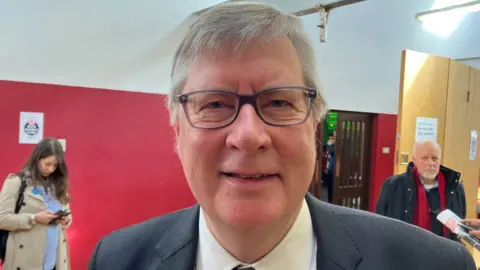 Andrew Sinclair/BBC
Andrew Sinclair/BBCIn Essex, "hotspot policing" is not new, according to the county's police, crime and fire commissioner Roger Hirst.
"We've been doing it for a while here in Essex and I am glad they are picking up on it nationally," Mr Hirst said.
He said officers used the latest available crime data to target areas "the size of one or two football pitches".
"If we have that pattern of data we can do this proactive policing in hotspots, getting cops out of their cars for as little as 15 minutes a few times a day - it really makes a difference."

Find BBC News: East of England on Facebook, Instagram and Twitter. If you have a story suggestion email [email protected]
